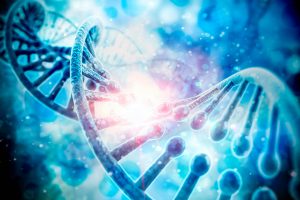The truth about genetic testing and your health
From consumer level kits, like 23andme and Ancestry, to physician-ordered workups, the demand for genetic testing is soaring—but is it really for everyone?
“I think the proliferation of home testing kits has given people the idea that results are pretty straightforward when they are actually just a small piece of a complex puzzle,” says Jane Balbo, DO, assistant professor of Family Medicine at Ohio University Heritage College of Osteopathic Medicine.
The allure of a fast and easy science-based health predictor is strong—something consumer-targeted services understand when they offer clients access to their raw genetic data in its entirety. This allows people to check their genetic markers for everything from gluten allergies to ovarian cancer to family ancestry.
The problem is not all this data is validated, meaning people may get some serious anxiety or a false sense of security based on results that haven’t been checked for accuracy. For this reason, Dr. Balbo always refers concerned patients to a genetic counselor rather than directly to a specialist for treatment.
“While consumer genetic testing may seem easy and fun, it may not provide the answers people are hoping to get,” says Nichole Morman, lead genetic counselor at OhioHealth Genetic Counseling. “The results come unverified and out of context, so they should not be used to make medical decisions.”
First look to the past
Morman says looking at your personal and family medical history is a much better starting point. For people who do have genetic diseases in their families and want to know their risk, getting a referral to a genetic counselor is the first step.
At the first appointment, Morman has patients bring in detailed records of their relevant personal and family medical records. They spend an hour on average combing through the information and discussing the patient’s risk factors for cancer and steps that can be taken to prevent and detect it earlier.
If we were to test everyone for everything, we would end up with a lot more questions than answers.
“After that, we know what genes we need to test,” says Morman. “Sometimes, we find out that we don’t actually need to test the patient but rather we need to test one of his or her relatives.”
Morman gives an example: If a patient’s aunt and grandmother both developed breast cancer due to a BRCA gene mutation, there’s a clear hereditary risk. However, people only pass half their genes down to their children. So, while the grandmother passed down the BRCA gene mutation to the patient’s aunt, it’s not guaranteed that she passed it to the patient’s mother.
In such cases, Morman would first want to test the patient’s mother. If it turned out she didn’t carry the gene mutation, then there would be no reason to test the patient. In the event that both mother and daughter tested positive for the gene mutation, then Morman and the patient’s primary care physician could help create a plan for continuing care.
“Osteopathic medicine is very much about prevention,” says Dr. Balbo. “When I get patients who have undergone genetic testing and found a positive risk, we then set out to mitigate that as much as possible.”
Dr. Balbo says they can consider changes to diet and other lifestyle factors, like smoking and drinking, as well as increased frequency in screening for the disease.
Understanding limitations
When done thoroughly and correctly with medical professionals, it seems like genetic testing would be great for everyone. A comprehensive genetic database might yield new understandings and allow scientists to predict genetic risks for disease with greater accuracy.
Before we expand genetic testing, we really need to do better job of educating the public about it.
However, neither Balbo nor Morman believe that to be a good idea—for a number of reasons.
“Testing is expensive and complicated,” says Morman. “If we were to test everyone for everything, we would end up with a lot more questions than answers. That uncertainty about serious disease risks can cause a lot of anxiety for patients and would likely lead to some negative outcomes.”
She explains that when testing a gene, there are thousands of potential variants in that gene. The results fall into three categories: No mutation, a dangerous mutation, or a variant of uncertain significance.
That last category is tricky because it means, at this time, scientists don’t know what it means. When it comes to cancer-related genes, in 90 percent of cases, variants of uncertain significance have turned out to be negative results, meaning they are not harmful.
Anxious patients who get uncertain results may needlessly seek out aggressive treatments, like preemptive surgery. Morman says the cost and possible negative side effects of unnecessary treatment on a mass scale would likely do more physical and financial harm than good in the near term.
“I think we’re already seeing way too many patients and physicians who do not understand the difference between consumer and clinical genetic testing or how to interpret the results of either,” says Dr. Balbo. “Before we expand genetic testing, we really need to do a better job of educating the public about it.”
